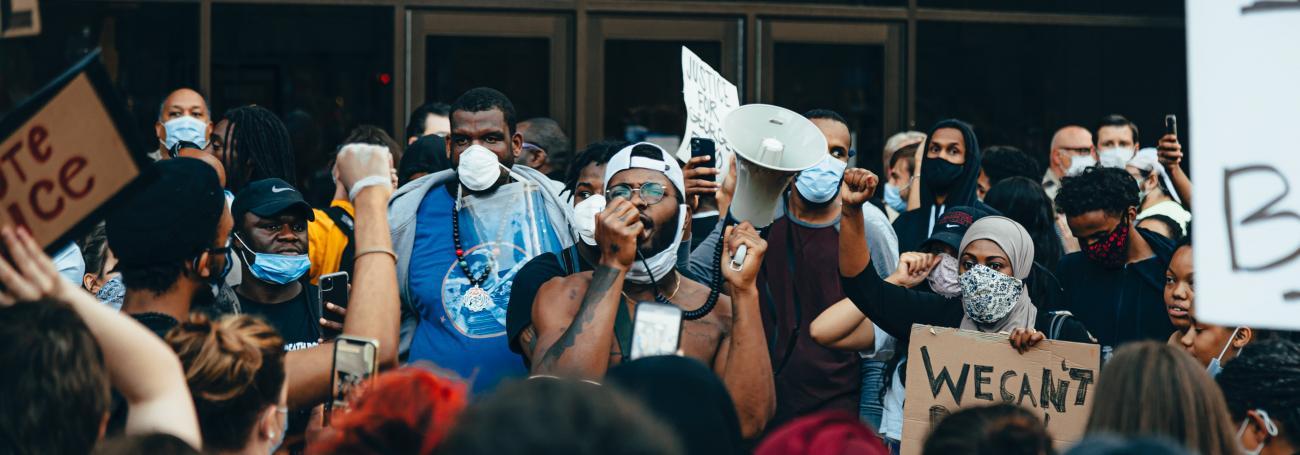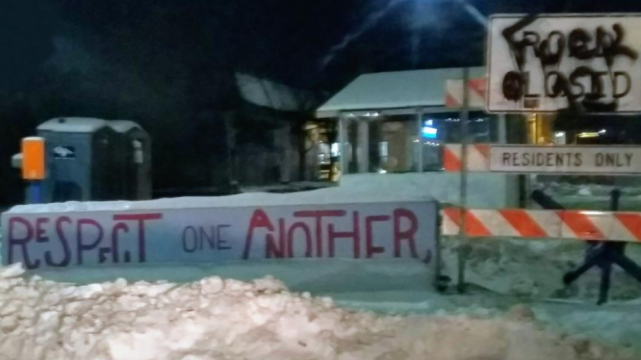

Remembering to restore
‘Sorry, I need to cancel our meeting.’ It is likely many people experienced this statement (or some variation of it) in 2020. It is also likely some of these cancellations led to a deeper awareness or insights previously unexperienced.
For me this realisation started with a series of collaborative conversations with a good friend. We had been meeting to explore ideas on Minnesota’s criminal legal system when I received their message stating that they were devastated and heading ‘to the protest at 38th and Chicago at 5PM.’ Snapshot results of the Internet keyword search entered for May 26, 2020, time-stamp 15:49hrs only noted a May 25 online news reporting of a young man who had died on his way to the hospital after being in police custody. Response Participation Protest was yet to be documented at the time. (1)
I had been offline all day and came on in time for our meeting. My greeting was what we all now understand as (another) watershed moment in our global history. Tragedy had struck the night before, resulting in a(nother) young man’s death at the hands of our Minnesota law enforcement (police) officers.
I would receive an onslaught of calls and communications from friends as far as Germany and Nigeria and as close as the Twin Cities (Minneapolis and St Paul) area to make sure I was safe.
I was and I still am. Physically, that is.
This moment and ones before it
As a restorative justice (RJ) researcher and practitioner, most of my time is spent creating and holding space for differences to unfold, while exploring how to hold our Minnesota community together as we reckon with difficult and painful realities. Two of these realities will be shared below: the first from former St Paul Police Sergeant Melvin W. Carter II (and founder of Save Our Sons [SOS-MN]) and the second from Russel T. Balenger, co-founder of The Circle Of Peace Movement (TCOPM). We three RJ practitioners invite you on a textual sojourn of remembering pains of 2020. Our hope is to foster deeper understandings of the restorative philosophy. And as with any RJ efforts, we welcome your feedback.
We start with what we do know: respect is central to restorative practice, no matter the context. And respect — no matter how it is employed — offers a promise to engage beyond soundbites of labels like defunding, law and order or the like. To be clear, we are not subject matter experts on criminal legal matters. What we can speak of are the lived experiences at the intersectionality of Minnesota’s criminal legal system. Carter and Balenger will attest to being on the receiving end of legal practices that disproportionately affect Minnesotans of the Black (OBlC) and Brown colour (OBrC). (This is an adopted term, serving to equalise the language on race and its asymmetrical power imbalances in Minnesota and the US at large. These terms are only employed to communicate the perception of how we categorise groups of people based on skin pigmentation and not on cultural or ethic origins. For example, OBrCs (Of the Brown Colour) can refer to individuals, Americans of South-Asian, Southeast-Asian, Middle-Eastern or Indigenous peoples. The same stands for OWCs (Of the White Colour) who are of Russian, Croatian or Iranian peoples.)
The element of respect in restorative philosophy teaches us that community is hugely significant in creating outcomes that meet needs arising from perpetuated societal harms. For example, we know that the crime of burglary in a community causes neighbours in close proximity to question their safety, even if the said harm is addressed by the police. However, this fear can be further reduced if police and non-police citizens (2) have ongoing relations that are positive. Neighbourhood residents are more likely to feel like they have recourse for the negative harms existing in their area, while affording police officers the opportunity to serve and protect the neighbourhood in which they are tasked.
Carter reflecting: ‘Mothers didn’t really want to call the police on their sons, because general policing will run a warrant and find some dope on a “gotcha” and then fuel them into the mass incarceration system.’ For policing — and we must remember that all policing is community-policing — to emerge from its insidious roots of slave patrolling (MPD150, 2020, p. 8), we will have to repurpose it as peacemaking and peacekeeping. After all this is in line with the stated missions of (at least) five police departments in Minnesota’s central city (Twin Cities) areas. Here are those five:
- Brooklyn Park Police Department is to ‘enforce[s] the law fairly and impartially to give our whole community a sense of security and respect.’ Of note is the visual and textual categorisation in which BPPD communicates its mandate, where it is filed under the ‘Health and Safety’ tab. This is in contrast to the other four which list their departments under government.
- The Minneapolis Police Department is ‘to protect with courage, to serve with compassion.’
- Roseville Police Department employs four values statements, two of which focus on respect (for) and service to the community.
- St Anthony Village is ‘to improve the overall quality of life by preserving the peace and safety of the community.’
- And St Paul’s is to ‘protect the peace and maintain public safety through trusted service with respect.’
Evidently, the theme of these five is to treat all with respect. The actual effects are a mixed bag.

Along with Carter is Balenger whose Minnesotan roots connect several generations to the arrival of the first OBlCs to arrive from the South in the 1860s. And in a lesser-known history, these OBlC pioneers received a chilly welcome, not unlike our Minnesota winters (see Pilgrim Baptist Church website, Long Form History). There is a now growing pattern of undeniable evidence that documents how every state in our United States of America was uncomfortable with OBlCs, even as some were less vocal than the southern states.
For our part in Minnesota, we have historical documentary forms such as the Twin Cities Areas’s Twin Cities Public Television (tpt)’s North Star: Minnesota’s Black Pioneers as well as Duluth Area’s WDSE-WRPT’s I Can’t Breathe: A CJM Memorial.
For my part, as an OBlC-Minnesotan whose roots are directly linked to Nigeria (versus our American legacy of enslavement), the late 1990s college education of ‘US History’ on Reconstruction and the like now appears incomplete, at best. This history is also confirmed by oral traditions of OBlCs who are the legacy of enslaved peoples. Carter’s autobiography is an attempt to capture and memorialise some of these oral traditions (Carter Jr, 2019).
Any hope (or impetus) for change might stem from our willingness as Minnesotans to reckon with an exhaustive examination of our ‘Niceness’ or ‘Northstar’ image as a beacon or refuge from slavery and oppression. Balenger’s experience with our criminal legal system is a painful one in which their family literally had to hide their daughter in private school where she would have limited contact with police officers (who are in public schools). And for their grandchildren, they found that sending them to other states, like Florida, allowed them to flourish. It is important to note that Balenger, Carter and myself have somewhat privileged lives compared with other OBlCs who we often see in our individual community work. Many of them have no social support or agency and despite the amazing efforts of Carter’s SOS-MN and Balenger’s TCOPM Minnesota’s OBlC and OBrC youths are still lagging behind. The public accountability thrusted on us by the double-edged sword of global interconnectedness provides us with a moment to acknowledge harms that are more than two centuries in the making.
Remembering to reckon in order to restore
I still remember when I presented my research on peacemaking circles at the 2010 Bilbao conference to a relatively-muted reception. I am forever grateful to a forward-thinking and open-minded Board Member who tempered some of the responses that questioned the value or validity of the Circle process by reminding the audience that the response I was given was not dissimilar to what they experienced from legal establishments in their various European countries. Continued collaboration and a commitment to fostering consensus is what will keep RJ work and its practitioners successful in addressing conflicts (in whatever contexts).
For the time being, we three ‘keep keeping on.’ Each Monday we and several others gather to end the violence and promote healing, via our virtual Circle meetings. We have everyone from non-police to police members, all OBlCs, OBrCs, and OWCs. The problems that provided us with the collective trauma of the George Floyd tragedy have long been present with us in Minnesota, the United States and beyond its shores. If our criminal legal systems can re-assess through a re-humanising of policies maybe we can begin to design an equitable system of accountability that is less about soundbites and more about a deeper respect for each Minnesotan. If we can begin to reckon with our past and reflect on 2020’s gift of accountability, we just might begin to heal and build upon a social infrastructure that allows for our present to inform a future that will restore all of us.
Adepeju O. Solarin
Chief Collaboration Officer, Minnesota Cooperative Conflict Collaborative, team.respect-collab@tutamail.com
with the contributions of:
Russel T. Balenger
Co-founder, The Circle Of Peace Movement
Melvin W. Carter
Executive Director, Save Our Sons, Minnesota Cooperative Conflict Collaborative
Notes
1 Some hyperlinks provided by the authors are not accessible to people living in Europe and have been omitted.
2 An intentional use of the term non-police (versus community) here is to reflect on our use and definition of the term ‘community.’ In re-examining RJ philosophy, one will find that ‘community’ does not (necessarily) delineate between police and the community. In fact, in our early documentations of RJ practices participants in the VOMs or FGCs were often criminal legal (or law enforcement) professionals (see Umbreit et al., 2005; Walgrave, 2008).
References
Carter Jr, M.W. (2019). Diesel heart: an autobiography. St Paul, MN: Minnesota Historical Society Press.
MPD150 (2020). Enough is enough: a 150-year performance review of the Minneapolis Police Department. 2nd ed. Minneapolis: MPD150. Expanded edition summer 2020.
Umbreit, M., Vos, B., Coates, R.B. and Lightfoot, E. (2005). Restorative justice in the twenty-first century: a social movement full of opportunities and pitfalls. Marquette law review 89(2):251–304.
Walgrave, L. (2008). Restorative justice, self-interest and responsible citizenship. Cullompton: Willan.

